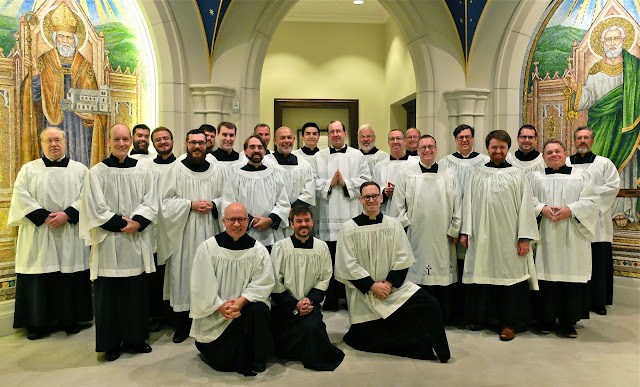Instituted Acolytes & The Exercise of the Subdiaconal Ministry
 |
| Chair of Saint Peter, Instituted Acolytes, Class of 2017 |
In his 1972 Motu Proprio entitled Ministeria Quaedum, Pope Paul VI reformed the so-called "minor orders" in the Church, the steps which would precede ordination to the diaconate and priesthood, In doing so, he recalls that certain ministries were established by the Church for the service of the People of God and as an assistance to to offering due worship to Almighty God. In this reform, the Holy Father restored these ministries to the faithful, uncoupling them from the preparation of men for the sacred priesthood. Pope Paul suppressed the office of subdeacon and other minor orders, though the ministry and service once reserved to subdeacons continues in the Church and is exercised by readers, cantors, servers, extraordinary ministers of Holy Communion, and by instituted acolytes.
In other words, the order of subdeacon, as such, no longer exists in the Latin Church - there are no "subdeacons". The functions of the subdiaconate, however, have been preserved and have passed into the institution of lector and acolyte - there remains a subdiaconal role or ministry.
https://sites.google.com/site/olwservers/glossary/glossary-b/bishops-letter-on-instituted-acolytes-1
Bishop Lopes' comments relate directly to a section of Ministeria quædam that reads as follows:
4. Two ministries, adapted to present-day needs, are to be preserved in the whole Latin Church, namely, those of reader and acolyte. The functions heretofore assigned to the subdeacon are entrusted to the reader and the acolyte; consequently, the major order of subdiaconate no longer exists in the Latin Church. There is, however, no reason why the acolyte cannot be called a subdeacon in some places, at the discretion of the conference of bishops.
There are some dioceses which conform to Ministeria quædam. The Diocese of Lincoln, Nebraska, for example. Groups such as the Priestly Fraternity of Saint Peter (FSSP), and the Institute of Christ the King Sovereign Priest (ICKSP), retain the subdiaconate according to the pre-Vatican II design.
In the Ordinariate, more than eighty men have been instituted to serve as acolytes in the past two years. The Ordinariate is faithful to the teaching of Ministeria qæaedam.
Note 7 of Ministeria quædam may be of interest to our Ordinary Form brethren.
7. In accordance with the ancient tradition of the Church, institution to the ministries of reader and acolyte is reserved to men.
Note 7 of Ministeria quædam may be of interest to our Ordinary Form brethren.
7. In accordance with the ancient tradition of the Church, institution to the ministries of reader and acolyte is reserved to men.
- - -
The Most Reverend Steven J. Lopes, Bishop Ordinary of the Personal Ordinariate of the Chair of Saint Peter, holds the doctorate degree in sacred theology from the Gregorian University. He was an official of the Congregation for the Doctrine of the Faith, and was a professor of theology at the Gregorian. He was personal aide to William Cardinal Levada, Prefect for the Congregation of the Doctrine of the Faith from 2005 to 2012. Beginning in 2012, His Excellency served as the secretary of the Anglicanae Traditiones commission, that developed the Ordinariate Missal (Divine Worship: The Missal).
The Most Reverend Steven J. Lopes, Bishop Ordinary of the Personal Ordinariate of the Chair of Saint Peter, holds the doctorate degree in sacred theology from the Gregorian University. He was an official of the Congregation for the Doctrine of the Faith, and was a professor of theology at the Gregorian. He was personal aide to William Cardinal Levada, Prefect for the Congregation of the Doctrine of the Faith from 2005 to 2012. Beginning in 2012, His Excellency served as the secretary of the Anglicanae Traditiones commission, that developed the Ordinariate Missal (Divine Worship: The Missal).





.png)
Comments
Post a Comment
Your comments will be appreciated and posted if 1) they are on topic and 2) preserve decorum.
Stand by your word.